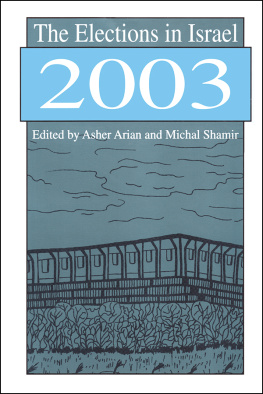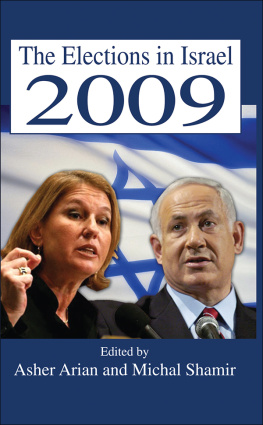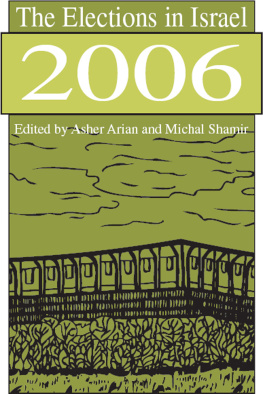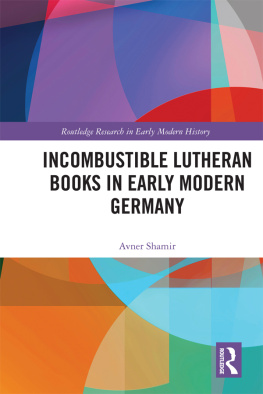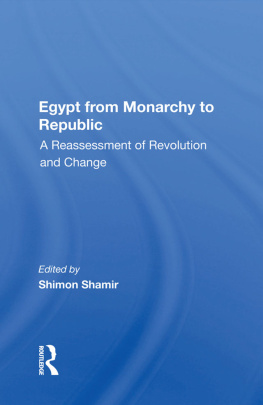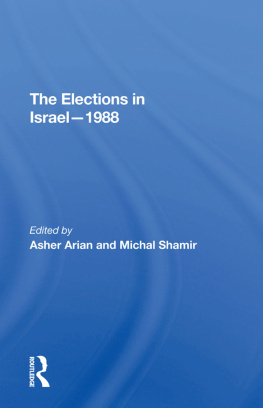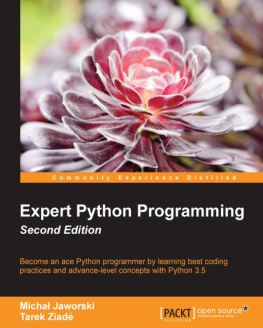Published in cooperation with the Israel Democracy Institute.
The Israel Democracy Institute is an independent, non-partisan think tank dedicated to strengthening democracy in Israel. It serves the Knesset and its committees, government offices, public institutions, local government, and political parties by undertaking research and making recommendations for reform and change.
In addition, the Israel Democracy Institute undertakes comparative studies of legislative, structural, and electoral systems of other democratic regimes. The IDI also aims to enrich public discourse and encourage innovative thinking by initiating discussion of topics on the countrys political, social, and economic agendas, with the participation of legislators, policymakers and academics.
The IDI makes its findings available through the publication of position papers and books in the Democracy Library and its other series.
Editor-in-chief: Uri Dromi
Administrative Head, Publications Dept: Edna Granit
Publications Editor: Yael Moshieff
Translation and Editing of this Book: Sagir Ltd.
Production Coordinator: Nadav Shtechman
First published 2005 by Transaction Publishers
Published 2017 by Routledge
2 Park Square, Milton Park, Abingdon, Oxon OX14 4RN
711 Third Avenue, New York, NY 10017, USA
Routledge is an imprint of the Taylor & Francis Group, an informa business
Copyright 2005 by Taylor & Francis
All rights reserved. No part of this book may be reprinted or reproduced or utilised in any form or by any electronic, mechanical, or other means, now known or hereafter invented, including photocopying and recording, or in any information storage or retrieval system, without permission in writing from the publishers.
Notice:
Product or corporate names may be trademarks or registered trademarks, and are used only for identification and explanation without intent to infringe.
Library of Congress Catalog Number: 2004051789
Library of Congress Cataloging-in-Publication Data
The elections in Israel, 2003 / Asher Arian and Michal Shamir, editors
p. cm.
Includes bibliographical references and index.
ISBN 0-7658-0268-6 (cloth: alk. paper)
1. Israel. KnessetElections, 2003. 2. ElectionsIsraelHistory. 3. IsraelPolitics and government1993- I. Arian, Asher. II. Shamir, Michal, 1951-
JQ1830.A95E434 2004
324.95694'054dc22
2004051789
ISBN 13: 978-0-7658-0268-2 (hbk)
Contents
Michal Shamir and Asher Arian
Asher Arian and Michal Shamir
Of er Kenig, Gideon Rahat, and Reuven Y. Hazan
Menachem Hofnung
Ami Pedahzur
Michal Shamir and Keren Weinshall-Margel
Tamir Sheafer and Gabriel Weimann
John H. Aldrich, Andre Blais, Indridi H. Indridason, and Renan Levine
Michael Shalev and Gal Levy
Asher Cohen
Nadim Rouhana, Nabil Saleh, and Nimer Sultany
Ken Goldstein and Zvi Gitelman
Michal Shamir and Asher Arian
The 2003 elections saw Israels return to the family of parliamentary nations after it experimented with the direct election of the prime minister from 1996 through 2001. The change was implemented in 2001, soon after Ariel Sharon of the Likud won the special election for prime minister that unseated Labors Ehud Barak. In 1996, Likuds Benjamin Netanyahu edged out Shimon Peres of Labor in an extremely tight race. The 1999 elections resulted in Baraks defeat of Netanyahu in a landslide victory, and then in 2001 Sharon ousted Barak by an even greater margin of votes. By 2003, in apparent political exhaustion, the system returned to a fixed-list method of selecting Knesset members on the basis of proportional representation. The prime minister would then be selected upon receiving the confidence of the Knesset.
In the 2003 contest, it was clear who would be the next prime minister as the polls closed. The election results are presented in . The Likud and its leader, Ariel Sharon, were the big winners of this contest. The Likud was elected the largest party, outdistancing all others by far, including the once dominant partyLaborwhich obtained that year less than half of Likuds votes. Sharon returned to the prime ministerial post, at the head of a new and unprecedented coalition, with Shinui on his left and Mafdal (National Religious Party) and Ihud Leumi on his right.
The January 28, 2003 election was held more than two years into the second Intifada (Arab uprising), an extremely bloody period in the turbulent relations between Jews and Arabs, Israelis and Palestinians. Terrorist attacks abounded, and the number of civilian casualties reached an unprecedented high. Furthermore, the repercussions of the continued violence and its disastrous effects on the economy became increasingly evident, as many Israeli citizens felt the economic downturn in a very personal manner. The elections were held in a grim climate of opinion, where the publics faith in the Palestinians and in the prospects for peace were shattered. Seventy-two percent of Israelis surveyed in our pre-election poll, The Likud, with Ariel Sharon at its head, won an extraordinary victory, leaving all other political parties far behind.
Table I.1
Results of the 2003 Knesset Elections
The Election Campaign
On February 6, 2001, Ariel Sharon defeated Ehud Barak in the last election held under the direct election of the Prime Minister system. He put together a broad national unity government, which allowed him to stay in power for nearly two years, despite frequent coalition crises and constant threats and actual desertions of the Ihud Leumi, Am Ehad, Shas, Gesher and Labor. When the Labor ministers headed by Fuad Ben-Eliezer resigned over the budget on October 30, 2002, Sharon enlisted Benjamin Netanyahu and former chief of staff Shaul Mofaz to join his government. On November 5, Sharon went to the president, Moshe Katzav, notifying him that under the current conditions in the Knesset, the government could not continue its term, and asked him to dissolve the Knesset and announce early elections according to Article 22 of the Basic Law: The Government. Within days January 28, 2003 was set as the election date, and the short and intense campaign began. On November 19, Amram Mitzna, then mayor of Haifa, was elected in the Labor primaries to head its list, obtaining 54 percent of support over Ben-Eliezers 38 percent and Ramons 7 percent. On November 28, Ariel Sharon beat Netanyahu by 56 percent to 40 percent (a third candidateFeiglin, obtained 3.5 percent) in the Likud primaries. Within a few weeks the politicians compiled their party lists. Labors primaries were held on December 9. However, public interest was focused on the Likud central party and the list of candidates that it selected. Charges of bribes, votes for sale, and involvement of activists with criminal records in the Likud party list selection process surfaced, and Prime Minister Sharon hastened to fire deputy minister Naomi Blumental, who refused to cooperate with the police investigation. Corruption scandals continued to plague the public agenda during the election campaign, with Labor party candidates accused of wrongdoing as well, and Prime Minister Sharon personally implicated. While these developments seemed to hurt the Likud in the polls for a short while in early January, the Likud soon appeared to have recovered. In our pre-election survey, more voters regarded the Likud as more corrupt than Labor; however, a majority of voters saw both as corrupt. Except for voters for the Left, majorities in all other groups saw both parties as corrupt, and did not list corruption as an important consideration in their vote. Corruption, while prominent in the news and in the public mind, did not seem to have much actual impact on the vote. In this volume, Hofnung discusses the issues of election financing and their corrupting effects in the 2003 elections from a broad, structural perspective, and also provides recommendations for a better incentive structure that takes into account the constraints and opportunities of the electoral race.



